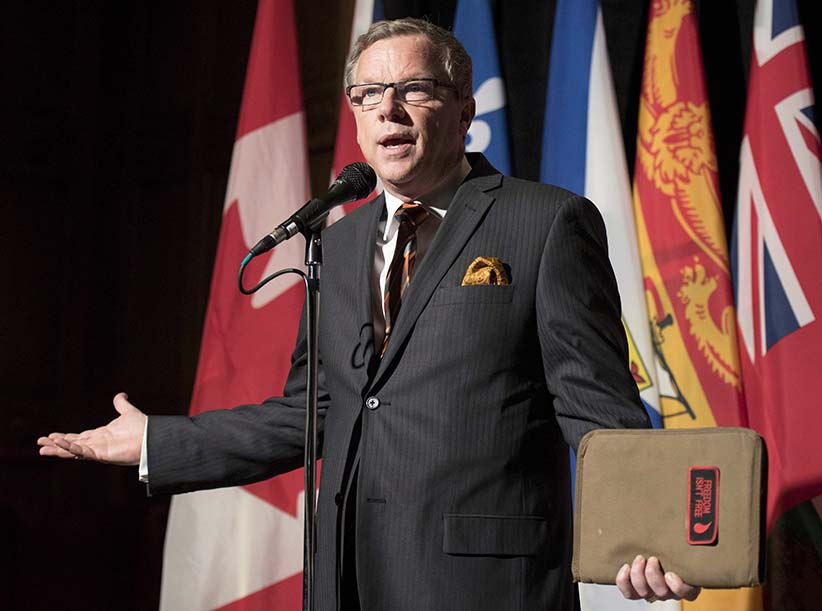Amid a climate-change parade, Brad Wall casts himself as Harper Lite
A day after Alberta announced new policies to fight climate change, Saskatchewan Premier Brad Wall strikes a more fretful tone
Saskatchewan Premier Brad Wall speaks to reporters before a meeting with premiers hosted by the Council of The Federation in Ottawa on Monday, Nov. 23, 2015. (Justin Tang/CP)
Share

There had been two questions about Syrian refugees, and Brad Wall—Saskatchewan’s premier—had responded. And then there was an awkward pause without a new question. And so Wall filled the space with something he apparently wanted to say.
“Can I just make a bit of comment about—we’re going to be talking about climate change here in a moment, for this day, for the meetings that are upcoming and I just want to offer this thought,” he said.
Twenty-four hours earlier, Saskatchewan’s western neighbour had made a dramatic announcement of a new carbon tax, a cap on emissions from the oil sands and an end to the use of coal to generate power. The premiers were now gathering in Ottawa to meet with the shiny new Prime Minister to discuss a co-ordinated approach to reducing greenhouse gas emissions, with the new federal government looking at its predecessor’s goal as its floor. The first ministers will then spend the weekend in Paris, meeting with each other and the world, to further discuss how they might proceed together. Hopeful noises are being uttered hither and yon.
But Brad Wall would strike a rather fretful tone.
“According to some industry estimates, there is upwards of around 30,000 direct layoffs in the energy sector in this country,” he said. “Indirectly it could be much greater than that, but suffice it to say there have been tens of thousands of job losses. And these are middle class families in western Canada, not only in Western Canada, the impact has been felt across the country, because the energy sector is important to all of Canada, but these are middle-class families that are going into Christmas without a job in these particular cases. And there has not been, if I may say, to me, a lot of coverage about that, a lot of attention paid to these massive layoffs in Canada. And I wonder if that might be the case were it another sector in the country. I don’t know if it would. But I say that to say, to offer this, we need to do better in terms of our record on climate change, our province needs to do better, and I can talk a little bit about that, but we can’t forget the economy.”
The Prime Minister and the other premiers might quibble with any suggestion that they are forgetting about the economy, but perhaps somebody had to be “that guy” at this party. With Alberta’s turn towards climate change and the defeat of the Conservative government in Ottawa, there is not presently anyone in a position of power standing athwart history yelling “I’m not sure about this!”—except, apparently, for Wall. Indeed, now Wall—previously cited as something of a hesitating voice—would sound like a lighter version of Stephen Harper.
“We cannot forget the jobs that quite literally are at stake in a sector that’s undergoing a lot of stress right now due to $40 oil,” he said. “We’ve got to find that right balance, because that economy and those jobs are broadening our tax base and paying for the quality of life that we want for all Canadians. And so that’ll be the context anyway for the remarks that I bring, for whatever it’s worth, for the input I have, to this meeting as well.”
By per capita emissions, there are two provinces, blessed and burdened of significant resource development, that stand out: Alberta and Saskatchewan. And so in any discussion of a federal approach to climate change, Alberta and Saskatchewan are significant questions. But while Notley is currently the good cop—even invited by Prime Minister Justin Trudeau to address the premiers at the start of today’s gathering—Wall sounded like the unenthusiastic cop. (Saskatchewan has, as Wall noted, invested significantly in carbon capture and storage, a system that would collect carbon emissions and store them underground. The province has also passed legislation that would charge certain emitters a carbon levy, much like Alberta’s previous policy, but Saskatchewan has never enacted those regulations.)
Related: An economist on what we know and don’t know about Alberta’s climate-change plan
Even on the matter of Alberta’s announcement yesterday, the Saskatchewan premier seemed less than completely thrilled. “Alberta has to make their own decisions and they’ve come to this decision obviously after a lot of consultation,” he said, adding that the new policies should take away an excuse from those who oppose pipelines from Alberta. Compare that to Quebec Premier Philippe Couillard who gushed that he wanted to “congratulate Premier Notley on her determination to act in a really substantive way.”
Three months out from the deadline the Liberal government has imposed on itself for a national plan, there are myriad questions about how a new deal on climate change will work and how any new target will be achieved, probably even for provinces like British Columbia, Quebec, Ontario and Alberta which have already acted, or will be acting, to implement carbon-pricing policies. The players here are all potentially significant. But perhaps Brad Wall is now the one to watch.